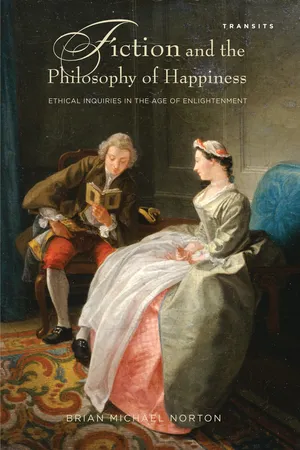
eBook - ePub
Fiction and the Philosophy of Happiness
Ethical Inquiries in the Age of Enlightenment
- English
- ePUB (mobile friendly)
- Available on iOS & Android
eBook - ePub
Fiction and the Philosophy of Happiness
Ethical Inquiries in the Age of Enlightenment
About this book
Fiction and the Philosophy of Happiness explores the novel's participation in eighteenth-century "inquiries after happiness," an ancient ethical project that acquired new urgency with the rise of subjective models of wellbeing in early modern and Enlightenment Europe. Combining archival research on treatises on happiness with illuminating readings of Samuel Johnson, Laurence Sterne, Denis Diderot, Jean-Jacques Rousseau, William Godwin and Mary Hays, Brian Michael Norton's innovative study asks us to see the novel itself as a key instrument of Enlightenment ethics. His centralargument is that the novel form provided a uniquely valuable tool for thinking about the nature and challenges of modern happiness: whereas treatises sought to theorize the conditions that made happiness possible in general, eighteenth-century fiction excelled at interrogating the problem on the level of the particular, in the details of a single individual's psychology and unique circumstances. Fiction and the Philosophy of Happiness demonstrates further that through their fine-tuned attention to subjectivity and social context these writers called into question some cherished and time-honored assumptions about the good life: happiness is in one's power; virtue is the exclusive path to happiness; only vice can make us miserable. This elegant and richly interdisciplinary book offers a new understanding of the cultural work the eighteenth-century novel performed as well as an original interpretation of the Enlightenment's ethical legacy.
Frequently asked questions
Yes, you can cancel anytime from the Subscription tab in your account settings on the Perlego website. Your subscription will stay active until the end of your current billing period. Learn how to cancel your subscription.
At the moment all of our mobile-responsive ePub books are available to download via the app. Most of our PDFs are also available to download and we're working on making the final remaining ones downloadable now. Learn more here.
Perlego offers two plans: Essential and Complete
- Essential is ideal for learners and professionals who enjoy exploring a wide range of subjects. Access the Essential Library with 800,000+ trusted titles and best-sellers across business, personal growth, and the humanities. Includes unlimited reading time and Standard Read Aloud voice.
- Complete: Perfect for advanced learners and researchers needing full, unrestricted access. Unlock 1.4M+ books across hundreds of subjects, including academic and specialized titles. The Complete Plan also includes advanced features like Premium Read Aloud and Research Assistant.
We are an online textbook subscription service, where you can get access to an entire online library for less than the price of a single book per month. With over 1 million books across 1000+ topics, we’ve got you covered! Learn more here.
Look out for the read-aloud symbol on your next book to see if you can listen to it. The read-aloud tool reads text aloud for you, highlighting the text as it is being read. You can pause it, speed it up and slow it down. Learn more here.
Yes! You can use the Perlego app on both iOS or Android devices to read anytime, anywhere — even offline. Perfect for commutes or when you’re on the go.
Please note we cannot support devices running on iOS 13 and Android 7 or earlier. Learn more about using the app.
Please note we cannot support devices running on iOS 13 and Android 7 or earlier. Learn more about using the app.
Yes, you can access Fiction and the Philosophy of Happiness by Brian Michael Norton in PDF and/or ePUB format, as well as other popular books in Literature & Early Modern History. We have over one million books available in our catalogue for you to explore.
Information
Table of contents
- Contents
- Acknowledgments
- After the Summum Bonum
- Chapter 1: The Moral in Phutatorius’s Breeches
- Chapter 2: “Vous croyez que le même bonheur est fait pour tous”
- Chapter 3: Tragic Eudaimonism
- Chapter 4: The Politics of Happiness
- Chapter 5: Rethinking Autonomy
- Conclusion
- Bibliography
- About the Author